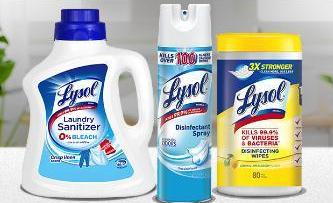
- posted: Oct. 07, 2020
During this COVID-19 pandemic, everyone has been taking extra precautions to do their part. One thing that many people have been doing is frequently cleaning their homes and common surfaces to help prevent the spread of this virus.
Please keep their pets in mind when cleaning their homes, as many common household cleaners and disinfectants are toxic to our pets, especially to cats.
Benzalkonium Chloride (BAC) is the active ingredient in many disinfectants like Lysol, Scrubbing Bubbles, Purell Products etc.
Benzalkonium Chlroide is a cationic detergent.
Cationic detergents are irritants that can cause adverse effects in cats. Toxicities typically are due to cats licking or walking over areas that have been cleaned or disinfected with products containing BAC. They also tend to groom themselves a lot, and can ingest the chemical by licking their paws or fur after walking over treated surfaces.
Symptoms are often delayed by several hours and can include:
- Lethargy
- Drooling/Hyper-salivation
- Red or inflamed tongue/Ulcers in the mouth
- Increased body temperature
- Reduced appetite/Not willing to eat
- Skin irritation and redness
- Breathing difficulties/Coughing
- Vomiting
In order to prevent toxicities from Benzalkonium Chloride containing products, we recommend:
- Handling BAC containing products carefully – clean up any spills immediately and keep products out of reach of pets and children.
- Always read and follow the manufacturers instructions
- Do not allow your cat to walk over a recently cleaned or disinfected surfaces, especially when they are still wet
- Prevent access to these surfaces until the product is completely dry
- If your cat regularly walks on kitchen or bathroom surfaces, it may be safer to use an alternative disinfection method such as: steam, anionic and non-anionic detergents, or diluted bleach.
If you suspect your cat has been exposed to any product containing Benzalkonium Chloride, we recommend you consider the following:
- Immediately bathe your cat to wash any of the disinfectant/chemical from their skin and fur.
- Contact your veterinarian immediately.
- Consider rinsing out their mouth with water
- DO NOT make your cat vomit.
Treatment for Benzalkonium Chloride poisoning may include: IV fluids, medications to reduce pain or drooling, antibiotics, gastroprotectants (medications used to protect the lining of the gastrointestinal tract) and oxygen therapy if there are breathing difficulties.
Please understand that as with any form of toxin ingestion, time is of the essence. Contact us here at Lakeshore Road Animal Hospital for further information or assistance! We are always here to help.
Office Hours
8:00 AM - 8:00 PM
9:00 AM - 2:00 PM
Closed
Location
2319 Lakeshore Rd W.
Oakville, ON L6L 1H2, Canada


